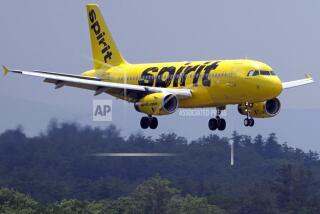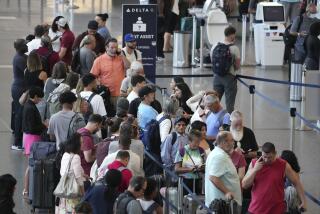Airlines Say Quick Comeback Isn’t on Horizon
- Share via
The airlines continue to suffer from depressed fares and sluggish passenger traffic after the Sept. 11 attacks, and a quick recovery is not in sight, top industry executives said Tuesday.
“Suffice to say that demand is off ... particularly with business travelers,” who account for the bulk of an airline’s income, Richard Anderson, chief executive of Northwest Airlines, said at an industry conference in New York.
Delta Air Lines Chairman Leo F. Mullin said his carrier’s revenue is running 35% to 40% below year-ago levels, and he doesn’t see a rebound until the second half of next year.
The airlines have slashed fares since the attacks in a bid to get travelers back in the air, but the discounted prices have sparked only a moderate increase in passenger traffic while also leaving the airlines with a smaller “yield,” or average revenue per passenger.
Most of the major airlines have slashed 15% or more of their operations in an effort to shrink their capacity to match the slowdown in travel.
But their operating expenses are still outpacing their yields, and most airlines today are losing millions of dollars daily.
Delta, for example, said this week that even though it has shaved 13% of its operations, its “load factor”--the percentage of seats filled with passengers--was a meager 61% in October, well below what the airline needs to break even. Industrywide, the load factor last week was only 60% even after accounting for the airlines’ capacity cuts, according to the Air Transport Assn., an airline trade group.
Even Southwest Airlines, the short-haul king that’s among the stronger carriers, is struggling to stay in the black. Its chief executive, James Parker, said at the conference that he couldn’t predict whether Southwest will turn a profit either in the current quarter or in the first quarter of 2002.
Parker said that passengers’ fear of flying after Sept. 11 still contributes to the weakness in travel, but that the slumping economy probably plays a bigger role, especially in the case of businesses that are keeping a lid on employee travel.
“I think it will take an improved economy to get back to the levels it [flying] had been on a year-ago basis,” he said.
The problems have prompted speculation about airline mergers. Donald Carty, chairman of American Airlines and its parent, AMR Corp., said “conditions are pretty ripe” for consolidation, and Mullin and others said it’s likely not all the airlines will survive.
But an airline merger would be a hard sell to union leaders and Congress, which might frown on the carriers using cash to gobble up rivals after pleading for the $15-billion federal bailout they received after Sept. 11, some analysts said.
The executives did sound some positive notes. Southwest, Delta and Northwest were among those saying they have solid cash positions at the moment, and Continental Airlines Chairman Gordon Bethune said he hopes his airline will begin enjoying a positive cash flow in the spring.
Northwest’s Anderson said his airline also is starting to see its yields edge up a bit, although he added: “We’d like to see them firm up on a quicker basis.”
Meanwhile, foreign airlines also continue cutting operations to adapt to the travel slump. Singapore Airlines said Tuesday that it is cutting its transpacific service, including a reduction in its Los Angeles-Taipei-Singapore service to five flights a week from seven, effective Jan. 13. The airline’s daily service from Los Angeles to Singapore with a stop in Tokyo will be unchanged.
More to Read
Inside the business of entertainment
The Wide Shot brings you news, analysis and insights on everything from streaming wars to production — and what it all means for the future.
You may occasionally receive promotional content from the Los Angeles Times.










